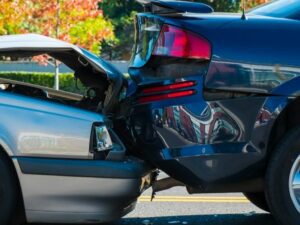According to the National Highway Traffic Safety Administration (NHTSA), a whopping one-third of all traffic collisions are rear-end accidents. When rear-end crashes happen, fault typically lies with the driver who hit the car in front. And in some states, that person is responsible for compensating the victims of the crash. But Florida law is different.
Florida is a no-fault state, meaning all parties must first turn to their own insurance policies after a collision. However, dealing with a rear-end collision claim could become more complex than you might think, especially if you suffered severe injuries or it was a chain-reaction crash. In addition, the cost of severe injuries could rapidly exceed the amount that your auto insurance policy covers, so you might need to seek additional compensation beyond your own coverage.
At Brooks Law Group, our Winter Haven car accident lawyers have the experience and resources necessary to fight for you if you’ve been injured in a rear-end crash. We take a people-first approach to injury cases. That means you’re not just a client to us. You’re someone who needs compassionate legal help, and we’re here to provide it.
Call or contact us today for a free initial consultation with a rear-end car accident lawyer.
What is a Rear-End Accident?
A rear-end accident occurs when one vehicle collides with another in front of it. When the car in front brakes or stops suddenly because of traffic or a road hazard, the following driver might not be able to avoid a collision if they were driving dangerously.
Several common factors cause rear-end collisions:
- Tailgating happens when a driver follows too closely behind another vehicle. This is a widespread cause of rear-end crashes because the driver in the back doesn’t give themselves an appropriate amount of time to react to expected traffic changes.
- Distracted driving is a leading cause of car accidents in the U.S., especially when it comes to smartphone use. Though it is illegal to text while driving in Florida, drivers sometimes pick up the phone as they are slowing to type or respond to a message. With their eyes, hands, and minds focused elsewhere, they may lose track of when the leading car stops and strike it from behind.
- Speeding is a top cause of all types of accidents. When it comes to rear-end crashes, people driving too fast may not be able to stop in time to avoid a collision. Even worse, speed-related accidents tend to cause more serious injuries because the force of impact is much greater.
- Drunk driving can cause rear-end collisions because intoxicated drivers have impaired motor, visual, and judgment skills.
Because rear-end accidents typically happen in a split second, victims rarely have ample time to move their vehicle out of harm’s way or prepare themselves for impact. This makes rear-end accidents capable of causing serious harm to unsuspecting drivers.
Who is At Fault in a Rear-End Accident?
 In most cases, the driver who rear-ended the vehicle in front is the at-fault party, and driver negligence is almost always to blame. But since Florida is a no-fault state, determining fault may only make a difference if you exhaust your no-fault benefits and meet other legal requirements.
In most cases, the driver who rear-ended the vehicle in front is the at-fault party, and driver negligence is almost always to blame. But since Florida is a no-fault state, determining fault may only make a difference if you exhaust your no-fault benefits and meet other legal requirements.
Under Florida law, every driver must possess at least $10,000 in Personal Injury Protection (PIP) benefits. This coverage is usually sufficient to protect drivers who have been in minor car accidents. However, some rear-end accidents are more serious and the victim’s costs may far exceed the PIP limits, especially if severe injuries and property damage occur.
Reach out to an experienced car accident lawyer if you’re struggling with excess expenses once your PIP benefits are paid. Crash victims who meet the “serious injury threshold” in Florida may be able to file a third-party claim against the at-fault driver’s insurance company. A successful claim could open the door to significantly more compensation for you. Figuring out whether you meet the threshold is not simple, so talking with an attorney can clarify every legal option available to you.
Liability in Chain-Reaction Rear-End Accidents
A chain-reaction crash happens when three or more vehicles are involved in a rear-end collision. Chain-reaction accidents often occur in heavy traffic situations when many cars are packed in closely together.
Because multiple vehicles are involved, chain-reaction rear-end accidents are sometimes called “pile-ups.” Here’s an example of what happens:
Driver D comes upon stopped traffic but fails to stop in time, colliding with Driver C in front of him. That pushes C’s car into Driver B’s vehicle ahead, which ultimately smashes into Driver A.
Any time there are multiple vehicles in a collision, it immediately becomes more difficult to identify the at-fault party(s) and determine liability. In most cases, the driver at the back of the collision will be identified as the at-fault party.
More than one person is typically injured in chain-reaction accidents. If the collision is severe enough, it’s likely that no-fault insurance policies will not cover the extent of the damage. In that case, other motorists may seek to recover damages from the at-fault driver’s insurance company.
How Our Lawyers Prove Fault
There are times when the driver in the back may not be liable for a rear-end accident. Sometimes, the fault may lie with a driver who slammed on their brakes unnecessarily or a driver whose taillights were not functioning correctly. For these reasons, it’s essential to seek legal help from Brooks Law Group.
Our Winter Haven car accident attorneys will thoroughly investigate your case to determine what happened and who is to blame. Photos, videos from the accident scene, witness statements, and testimony from reconstruction experts can help identify how fault should be distributed and argue for maximum compensation for you.
Compensation
Victims of a rear-end car accident in Winter Haven could receive compensation for:
- Medical expenses
- Rehabilitation
- Lost wages
- Accident-related expenses such as travel costs, medications, medical devices, and home renovations to accommodate a long-term disability
- Property damage
- Pain and suffering
Statute of Limitations for Florida Rear-End Accidents
You have four years from the date you were injured in a rear-end accident to file a claim against the at-fault party. While most injury cases settle long before a lawsuit is necessary, this is a critical deadline to remember. If you try to file after the statute of limitations has expired, you will likely lose your right to compensation forever.













